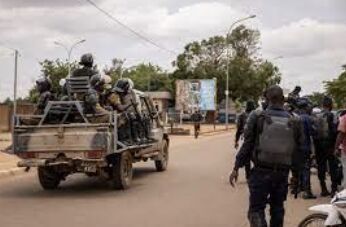Burkina Faso's Heartbreak: Massacre Claims Lives of Dozens, Including Innocent Children and the Elderly
Burkina Faso mourns after a village massacre claims the lives of around 70 people, mostly children and the elderly. Authorities are working to uncover the identity of the assailants. The nation continues to grapple with a jihadi insurgency and political instability.
The West African nation of Burkina Faso has been plunged into grief after a village massacre that claimed the lives of about 70 people, most of them children and the elderly. The brutal attack, which occurred earlier this month in the village of Zaongo, has shocked the nation and left authorities scrambling to uncover the identity of the assailants. Prosecutor Simon B. Gnanou revealed that the investigation into the massacre is ongoing. "At the current stage of our findings and the testimonies collected, the perpetrators of these atrocities remain unknown for the moment," he said in a news release.
The European Union also expressed its concern, urging the authorities to shed light on the circumstances surrounding the killings. Burkina Faso has been grappling with a jihadi insurgency linked to al-Qaida and the Islamic State group for years, resulting in thousands of deaths and over 2 million people internally displaced. The violence has also sparked political instability, with the country experiencing two coups, the most recent one in September 2022 that brought Capt. Ibrahim Traore to power. The current junta-led government has faced accusations of committing human rights abuses and cracking down on civil liberties in the name of national security.
Earlier this month, an emergency law was enacted, expanding the crackdown on perceived dissidents. A report by Human Rights Watch highlighted the conscription of journalists, civil society activists, and opposition members for government security operations across the country. In an effort to combat the jihadi threat, the government has enlisted tens of thousands of volunteer fighters. However, many civilians claim that these volunteers indiscriminately kill those suspected of collaborating with the extremists, leaving communities more afraid of the volunteers than the actual terrorists themselves.
As Burkina Faso mourns the lives lost in the recent massacre, calls for accountability and justice have intensified. Molly Phee, head of African affairs at the US State Department, joined the chorus, urging authorities to investigate and hold those responsible to account. The nation is now left grappling with the aftermath of yet another tragic chapter in its fight against terrorism.




